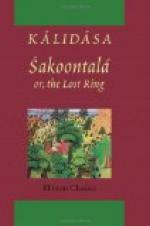123. All unadorned.
That is, from the absence of colouring or paint.
124. The power of darkness.
According to Hindu philosophy there are three qualities or properties which together make up or dominate humanity: 1. Sattwa, ‘excellence’ or ‘goodness’ (quiescence), whence proceed truth, knowledge, purity, etc. 2. Rajas, ‘passion’ (activity), which produces lust, pride, falsehood, etc., and is the cause of pain. 3. Tamas, ‘darkness’ (inertia), whence proceed ignorance, infatuation, delusion, mental blindness, etc.
125. Children of Brahma’s sons.
Ka[s’]yapa and Aditi were the children of Marichi and Daksha respectively, and these last were the sons of Brahma.
126. The ruler of the triple world.
That is, Indra, lord of heaven, earth, and the lower
regions.
Compare notes 110, 113.
127. Whom Vishnu, greater than the Self-existent.
Vishnu, as Narayana, or the Supreme Spirit, moved over the waters before the creation of the world, and from his navel came the lotus from which Brahma, the World’s Creator, here called the Self-existent, sprang. As Vishnu, the Preserver, he became incarnate in various forms; and chose Ka[s’]yapa and Aditi, from whom all human beings were descended, as his medium of incarnation, especially in the Avatar in which he was called Upendra, ‘Indra’s younger brother.’ Hence it appears that the worshippers of Vishnu exalt him above the Creator.
128. The earth’s seven sea-girt isles.
According to the mythical geography of the Hindus, the earth consisted of seven islands, or rather insular continents, surrounded by seven seas. That inhabited by men was called Jambudwipa, and was in the centre, having in the middle of it the sacred mountain Meru or Sumeru, a kind of Mount Olympus inhabited by the gods. About Jambu flowed the sea of salt-water which extends to the second Dwipa, called Plaksha, which is in its turn surrounded by a sea of sugar-cane juice. And so with the five other Dwipas, viz. Salmali, Ku[S’]a, Krauncha, [S’]aka, and Pushkara, which are severally surrounded by the seas of wine, clarified butter, curds, milk, and fresh water.
129. Bharata.
The name Bharata is derived from the root bhri (fero),’to support.’ Many Indian princes were so named, but the most celebrated was this son of Dushyanta and [S’]akoontala, who so extended his empire that from him the whole of India was called Bharata-varsha or Bharata-varsha; and whose descendants, the sons of Dhritarashtra and Pandu, by their quarrels, formed the subject of the great epic poem called Maha-bharata. The Hindus at the present day continue to call India by the name Bharata-varsha.
180. The Sage Bharata.
The Bharata here intended must not be confounded with the young prince. He was a holy sage, the director or manager of the gods’ dramas, and inventor of theatrical representations in general. He wrote a work containing precepts and rules relating to every branch of dramatic writing, which appears to have been lost, but is constantly quoted by the commentators. (See p. xxix.)




